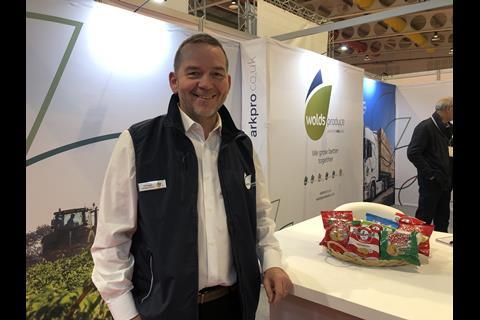Potato suppliers report progress in customers’ support for growers but this has not prevented a sharp fall in production as growers fight to stay afloat
Longer contracts and more flexibility on price, but fewer producers and lower volume.
These are the main consequences of a torrid two years for the British potato sector, according to Tim Foggin, MD of the recently acquired Yorkshire potato supplier Wolds Produce.
Covid, the war in Ukraine, rampant inflation, and volatile weather have been a perfect storm for producers in the past two seasons, he told FPJ at the British Potato Show in Harrogate.
“Whilst these are really challenging times for the potato industry, they are forcing important dialogue between growers, traders and buyers at every stage in the supply chain,” Foggin said.
He added that the recent headwinds have heralded a shift in supermarkets’ understanding of the cost pressures on growers and the significant risks they take to produce potatoes.
For context, Foggin explained that a lot of UK potato contracts are agreed six months before the start of the season. This meant that last season growers were signing contracts in December or January to start in July 2022.
“When those contracts were agreed, Ukraine hadn’t happened and growers were potentially stuck with a price that wasn’t viable,” he said. But thankfully, UK crisp manufacturers supported the industry by agreeing to “sensible uplifts” in the price paid to producers mid-contract.
Support from crisp manufacturers
“Last year, the crisp factories we deal with were very good,” he told FPJ. “They basically said: ‘What do we need to do? How do we deal with this?’
“We encouraged the crispers to support growers through this inflationary period so they could survive and produce potatoes again next year. They did a lot of analysis of what the cost increases for growers actually were, and we worked together to arrive at a figure.”
He noted that support for growers hasn’t been uniform across the retail sector, with some customers pushing for unsustainable prices despite the unprecedented and last-minute cost pressures on growers.
Stephen Park of major potato packer E. Park & Sons acknowledged that retailers, wholesalers and foodservice suppliers operate in a very competitive environment and can’t automatically give their suppliers all the price support they need. But he stressed that every one of E. Park & Sons’ customers had “listened”.
Equally, the contract prices the packer agrees with its growers are now “significantly higher” than they were two or three years ago, Park said. “Growers need this money to be able to invest in their businesses and store potatoes long term, which is now a significant cost.”
Longer contracts
Going forward, Foggin revealed that Wolds Produce is in discussions with some crisp manufacturers to consider longer contracts of two or three years, with price flexibility built in.
The challenges for growers have caused seed potato production to decline by about 23 per cent in the past two years, according to the Seed Potato Producer Register, which is the best indication of potato plantings in the UK.
In future, Foggin would like to see a more calculated approach to seed production based on longer-term assurances of production volume, thereby helping to balance supply and demand.
“When the yields aren’t as strong, there isn’t enough seed, so what we really need is a longer-term commitment to seed volumes which allows the whole supply chain to plan accordingly.”
Recovering lost production
Foggin predicts it will take at least two years for the significant reduction in British potato plantings to be recovered.
The Farmers Guardian estimates that the UK potato crop could be as low as 4.14 million tonnes this season, compared to a 6.2mt crop in 2017. This would make it the lowest GB potato crop ever recorded.
Foggin said 6mt was ultimately too large a volume for the UK market to absorb, however 4mt is insufficient. And he predicted that not enough potatoes are being grown this season to meet UK market demand, since some growers have reduced their plantings and others have switched to other crops.
Meanwhile, Park said that although domestic production is sufficient to meet demand for the time being, further weather challenges could necessitate imports of certain types of potato from countries such as Egypt and Israel in May/June 2024.
Price rises and consolidation ahead
This year, growing conditions have been better than in 2022 but they have still been less than ideal. Heavy autumn rains, particularly during Storm Babet and Storm Ciarán, have left some growers with big problems lifting crops.
“There are now some quality issues in store, and some potatoes are still sitting in waterlogged fields, so this will lead to a further contraction in available tonnes,” Foggin said, adding that store management would be paramount.
As a result of the ongoing challenges with weather, yield, reinvestment in machinery, and risk, the Wolds Produce MD says growers are understandably looking for further price increases for next season.
He added that he wouldn’t be surprised to see more consolidation across the potato industry over the next few years due to the ongoing cost pressures and changing weather patterns that are “clearly here to stay”.
“I think businesses under stress will continue to disappear until market prices reflect the risk involved and allow for reinvestment.”





